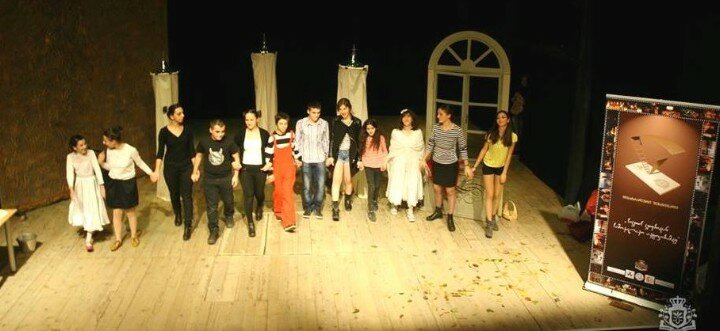End of the CHILD project - follow up
One of the first common projects of the Caucasus Network for Children (CNC) has come to an end: CHILD – Community Helping Inclusive Learning and Development – was successfully implemented by the CNC organizations Bridge of Hope and Orran in Armenia and the Georgian partners Union Beryllus and Liberta, who are affiliated members of the Network. The CNC partner in Georgia, the Civic Development Institute, was responsible for organizing the first advocacy conference on the topic of inclusion on regional level. The Austrian NGO Interkulturelles Zentrum was in charge of the overall project coordination.
The two year project started in mid 2013. Its mission was to promote access to and mainstream inclusive services and settings for children and families from different ethnic backgrounds suffering from post-conflict trauma, poverty, disability, and/or difficult family situations. With CHILD the project partners aimed at increasing of public awareness of the Georgian and Armenian societies to include vulnerable groups.
What has been accomplished by CHILD? The outcome has been such that the partners are highly motivated and striving towards continuing this project in order to multiply the many folded positive effects of the project - its approach, methodology and the activities, which have proven truly successful.
Community Clubs
In the centre of the project activities were the community clubs, which provided a space for inclusion, sharing, creativity, encouragement and simply “feeling home” for the children. Bringing together children with different social backgrounds outside the school fosters their mutual understanding, reduces prejudices and strengthens the sense of inclusive community. Through their active participation in the club activities, such as crafting, reading, media, sports, agronomy, art, and drama the children improved their social and language skills. Their self-consciousness was strengthened.
The community clubs in nine regions in Georgia and four in Armenia reached 817 vulnerable children and their families in Armenia and 750 children, 300 of them marginalized, in Georgia.
Roma communities
Tangible contribution was made towards reaching out to Roma communities as a new target group. The project supported 111 Roma children and their families in Georgia. The children were involved in the community club activities and the summer schools. To disseminate Roma history, a banner has been published including short information about Roma history and biographies of celebrities with Roma background such as Charly Chaplin the famous actor or music legend Elvis Presley. With the permission of the Ministry of Education and Science the banners were put in the entrance of each school where Roma children study or live in the local community.
Quite a novelty is the Roma research study, which was conducted under the lead of Liberta in the course of CHILD. The study aims at expanding the knowledge about the living conditions of this community group and setting up the inclusion process by establishing a comprehensive database.
Cooperation is key
Strengthening the cooperation among the various stakeholders of inclusive practices was another area the project focused on. Cooperation with the educational authorities is key in achieving sustainable progress in matters of inclusion. In Armenia the solid and long term cooperation of Bridge of Hope with the Council on Children’s Rights Issues and the community action plans has boosted inclusion to an extent that today the country’s inclusive policy can serve as best practice model for the region and beyond. In Georgia the close collaboration of Union Beryllus and the Ministry of Education within the Social Inclusion Supporting Program is a crucial precondition for the successful communal integration of disadvantaged children through school cooperation.
Regional cooperation
In order to make inclusion of vulnerable children a matter of regional concern, two regional advocacy conferences were conducted. The two events in Kvareli Lake, Georgia (October 2014) and in Dilijan, Armenia (May 2015) brought together civil servants, educators and practitioners from the civil society and served as important fora for sharing best practices in policy and implementation of inclusive education, and for discussing common problems as well as brainstorming joint solutions and cooperation in the field of inclusive education.
Regional cooperation was the motto for the children as well! The regional theatre festival that took place in November 2014 in Tbilisi was certainly a highlight in the lives of the performing young actors and actresses.
Donors and outlook
Two donor institutions made CHILD possible: the Foundation Open Society Institute and the Austrian Development Agency. Both donors are convinced that the project Community helping Inclusive Learning and Development - CHILD truly boosted the inclusion of marginalized young people and their families and have confirmed their readiness to support a follow-up project called Speaking of myself, which will start in late autumn 2015.
Keep yourself updated with inclusion issues across the Caucasus countries and follow the Caucasus Network for Children on this website or on facebook.










